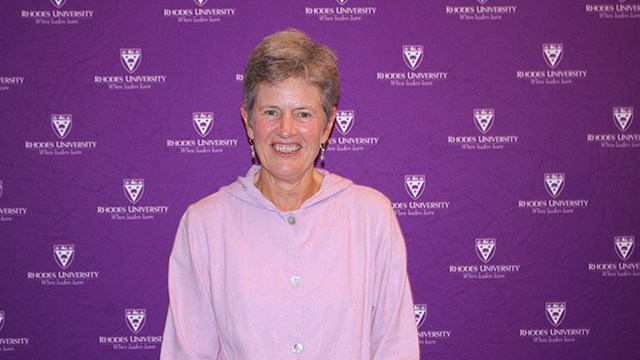
By Zandile Hlabangane, fourth-year BJourn student
On 14 May, Dr Karen Ellery, recipient of the 2018 Vice-Chancellor’s Senior Distinguished Teaching Award, held a lecture titled: “What happens in science classrooms? Insights from the fringe”.
Dr Ellery dedicated the lecture to a former student, Zanokhanyo Mazeka, who passed away in March of this year. Mazeka was in his third-year at Rhodes University, studying towards a triple major Bachelor of Science degree.
Dr Ellery explored issues around science classroom teaching, specifically around what is being taught, how is it being taught and what the values are that underpin the teaching.
The reason behind this curiosity, she explained, has a lot to do with the national statistics of the higher education sector, which show that much of the university curricula is alien and inaccessible to a number of students. Her ‘insights from the fringe’ arise from the fact that she teaches in the first-year Science Extended Studies Programme (SESP), a programme where students complete their degree over a period of four years.
Based on the research she conducted from her recent PhD, Dr Ellery divided the lecture into two main parts. The first part tackled mainstream first-year science teaching and lecturer expectations as well as the responses and needs of the student. The second part looked at the SESP and how it address these student needs. Dr Ellery said, “We view the SESP mandate as preparing students to be successful in mainstream.”
In terms of what the first-year science courses value, Dr Ellery used an iceberg metaphor. The part that is above the water represents the visible curriculum (science knowledge and skills), and the submerged part of the iceberg represents the hidden, invisible curriculum (values and dispositions).
The hidden curriculum can further be divided into two parts - the science ‘knower’ and the science ‘learner’. In terms of becoming and being science knowers (scientists), there is an expectation for students to be analytical, critical, logical and structured, among other things, whereas becoming and being an effective science learner in a university context speaks to what is required by student both inside and outside the classroom. This can include taking notes, identifying key points and asking questions in class, and also being self-regulated and independent learners who are developing in-depth understanding of the course content outside of class time.
Dr Ellery indicated that because the basis for achievement in first year is dependent upon students understanding and engaging with aspects of the ‘hidden’ curriculum, success can be difficult for some. The SESP tries to address these needs. SESP mostly consists of students who are the first in their family to come to a higher education context, attended “less privileged schools” and speak languages other than English at home.
The programme consists of three courses: Mathematics; Computer Skills for Science; and Introduction to Science Concepts & Methods (ISCM). ISCM is a year-long, multidisciplinary course (with components of physics, chemistry, HKE and earth sciences), which actively and explicitly teaches both science knowledge and skills as well as becoming and being science knowers and science learners. Dr Ellery gave examples of how this is achieved in the classroom.
When asked what was most valuable about being in the Extended Studies Programme, past students stated that they learned to write. Dr Ellery had this to say: “I think it is one of the most valuable things that we do: it’s not just the writing; it’s how we’re thinking. It’s all embedded and is part of what we’re doing.”
To conclude her lecture, Dr Ellery spoke about the process of transforming the curricula and how they are improving it by making the course content more relevant to the African context.
She is, however, aware that many students are still struggling with mainstream science in the higher education sector. She said, “Our students are the cream of the crop from the schooling system, and I argue that it is our responsibility to be creating spaces in the sector here to enable the access that they need.”

